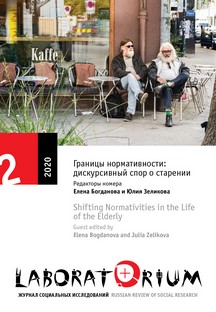Саморепрезентация Религиозных Организаций В Контексте Трансформации Социальной Политики В Отношении Пожилых: Между «служением» И «экспертизой»
Self-representation of Religious Organizations Providing Longterm Elderly Care: Between “service” and “expertise
Author(s): Arturs HolavinsSubject(s): Gerontology, Sociology of Religion
Published by: Центр независимых социологических исследований (ЦНСИ)
Keywords: Elderly Care; Faith-Based Organizations; Patience; Professionalization, Frame Analysis; Russia;
Summary/Abstract: The article presents results of the study of self-representation by two religious organizations in Saint Petersburg, Russia, that provide long-term elderly care. The main aim of the research is to reconstruct how faith-based organizations represent, or position, themselves in the conditions of expansion of the market of nonstate social services in Russia. The study was conducted within the qualitative paradigm of social research and used frame analysis as its main methodological tool. The study analyzed framing used in several dozens of the two organizations’ written texts, such as their official documents, news items, recommendations, leaflets, social media entries, and contents on their official web pages. Following the consensus existing in critical scholarship on the third sector professionalization, the main hypothesis of this study is that at the level of self-representation religious organizations readily abandon their original identity and values of spiritual concern and care for their charges, instead positioning themselves primarily as “experts.” In the course of the study, three mainframes were identified: religious “patience,” aligned with the original mission and identity of the organizations; “humanism,” popular among the medical geriatric community; and “professionalization,” which implies self-positioning as experts. The analysis revealed that discourses of “patience” and “humanism” are used relatively rarely, be it at the level of caregivers or in the organizations’ statutory documents. In turn, “professionalization” was the most common type of self-representation, proving the study’s main hypothesis to be correct.
Journal: Laboratorium. Журнал социальных исследований
- Issue Year: 12/2020
- Issue No: 2
- Page Range: 68-89
- Page Count: 22
- Language: Russian

